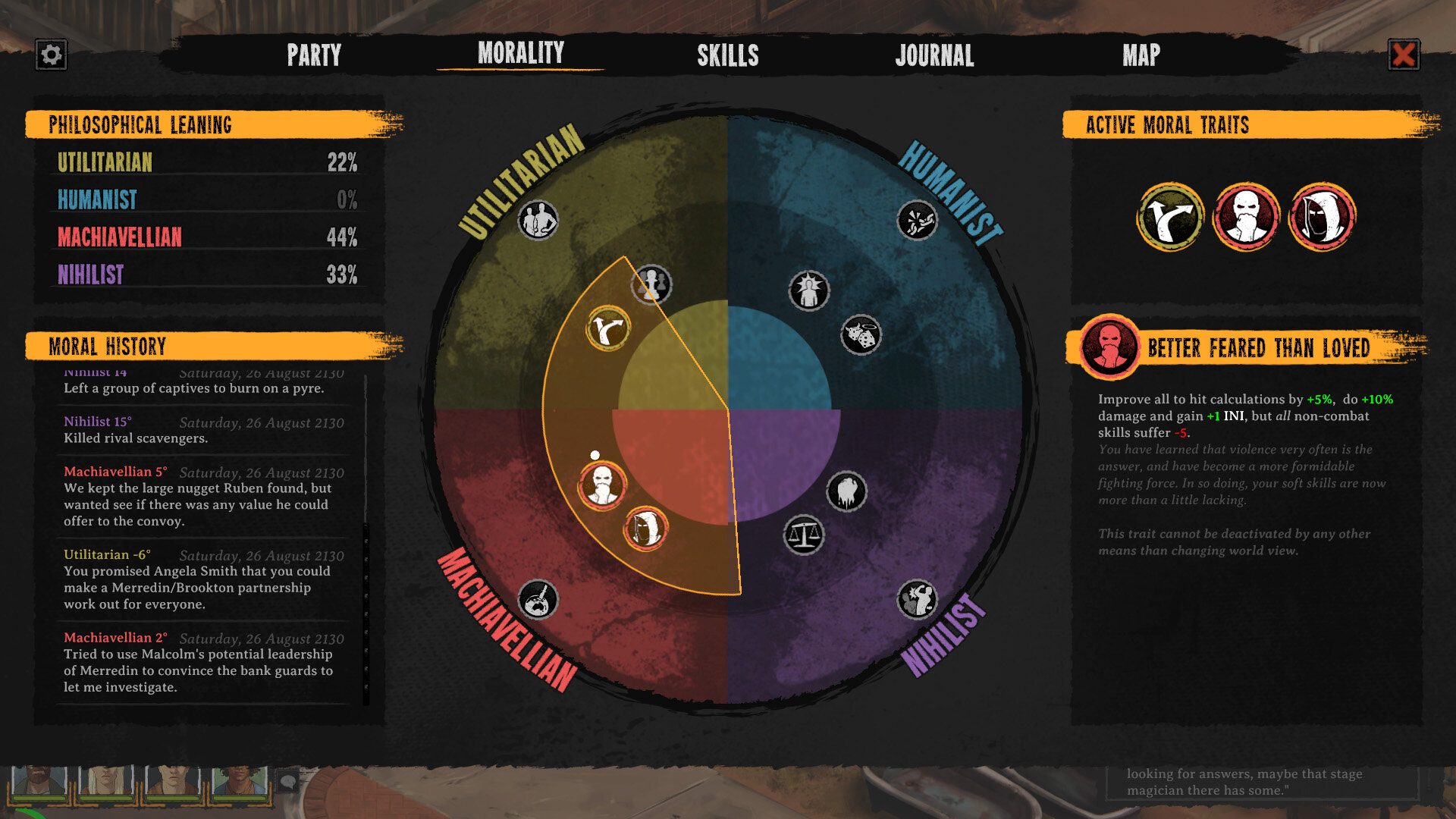Moral Compass Design Update – August 2020
Introduction
The Moral Compass is Broken Roads’ unique take on morality and alignment. It allows characters’ morality to gradually shift based on the player’s actions and decisions. Pivoting around a central point, and represented by a golden arc called their ‘World View’, players are able to choose dialogue and quest options from within that golden arc.
Recently we made some changes and additions to the Moral Compass design, both in terms of functionality and the specifics of the moral quadrants in place. In this post, we’ll run through these recent design decisions and the addition of ‘moral memory’. In a follow-up blog we will be detailing various functionality specifics, as well as a deeper dive into each quadrant. And if you’ve not read it yet, we did a Moral Compass overview blog some time ago which covers more introductory info.
A Change of Quadrants
First up, we’ve decided to change one of the quadrants from ‘Existentialist’ to ‘Humanist’. This came as a result of wanting to broaden the scope of that quadrant and incorporate a wider range of options that range from human-centric concerns for the individual to the group, while still allowing for inherent meaninglessness to gel with the border of the nihilism quadrant. And hey, Existentialism Is a Humanism, if Sartre is to be believed… Thankfully, most of what the team have incorporated in the Existentialist moral quadrant to date fits into the now Humanist quadrant, but with room for more nuance on top of it.
So, why four quadrants, and what is the significance of the borders between each quadrant?
As we explained in the overview blog, we have never intended the quadrants to represent good or evil, nor be simple stand ins for these. We want the chosen quadrants to represent a makeup of a character’s attitudes, values and general outlook in dealing with the situations that may be thrown their way in a desperate and savage post-apocalyptic world. The quadrants are also intended somewhat as non-exclusionary representations of attitudes towards individual and group values, and the border between each quadrant should flow logically into the next as well.
The humanist’s moral decisions can range from what they feel if is right for the group, on the Utilitarian side, to what is best for themselves, and all other considerations be damned, on the Nihilist side. In turn, the Nihilist edge of the Machiavellian quadrant can have some choices where it’s very clear that that character truly does believe that “the ends justifies the means”, regardless of harm caused. Likewise, the Machiavellian decision points closer to the Utilitarian edge can be seen as choices which benefit the larger group (in this instance, your companions and the convoy on the whole) and their standing amongst the various factions and powers at play in the world of Broken Roads, as how you handle yourself and your group can affect the convoy’s reputation. If Machiavellian actions can be seen as those which best serve the pursuit and maintenance of power, just what the power is serving will depend on where in the quadrant an action may sit.
Moral Memory
We also wanted to be sure that the golden arc representing a character’s World View, while limiting, did not feel restrictive. What we have settled on is a means whereby every decision in a moral quadrant expands (from the centre outwards) a persisting moral ‘memory’ that allows players to then always choose options or traits that fall within that memory’s area (note: moral ‘memory’ is the working title until we land on something final), even if outside of their golden arc.
Until now, characters would need to make numerous decisions on the fringes of their world view before their golden arc swung around to another quadrant and those options then became open to them. Now, they can make ‘low level’ decisions or take less extreme dialogue choices in other quadrants – everyone can be a little bit selfish under certain circumstances, say, or it’s easy to see situations in this world where being that little bit more threatening than normal can solve an immediate problem. This allows a character to have a little of each quadrant available at all times, but the really focused choices will still need to be within the golden arc.
Thus, while the compass is 360° around, the centre to the periphery is only 100. Your moral ‘memory’ in each quadrant will fill at a slower rate (currently looking at 1 or 2 per decision) and will be capped at a maximum of 75, thus making higher-level moral traits and options only ever possible if your golden arc covers them.
The current design also has it that your character starts with each quadrant at 25, meaning basic decisions from every philosophical leaning are always available to the player. We’re testing out having higher level decisions reduce the moral memory of the opposite quadrant. For example, a decision point in Machiavellian located between 75 and 100 would reduce the moral memory of the Humanist quadrant by 1, but not below a minimum of 25 again. Staying in one quadrant will make you narrow-minded but able to use higher-level options and take advantage of higher-level moral traits, while a wider range of choices results in a more broad-minded character who may have additional options, but not able to use certain moral traits.
We went through numerous iterations including multiple arcs, point- or ring-based solutions, persisting areas around decisions until landing on the ‘moral memory’ design.
More to come
We’ll do more a focused look at each quadrant and their moral traits as well as the specific workings of the Moral Compass in our upcoming blogs. As development progresses and we test, build and evolve all of the above, there’s no doubt that new and interesting adventuring elements and combat effects will arise from the Moral Compass design. We’re still more than a year from launch, and with the tech built out and a huge amount of time being put into testing and tweaking now, we’ll continue to iterate and improve as we go!




